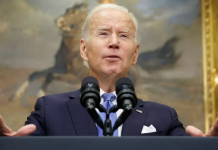Democrats cried with joy and pumped their fists in the air after the US Senate finally approved a key plank of President Joe Biden’s domestic agenda.
The bill, a product of 18 months of intense wrangling, will now be sent to the Democratic-controlled House where it could pass as soon as this week.
The Inflation Reduction Act includes $369bn (£305bn) for climate action – the largest investment in US history.
Its authors say it will reduce US carbon emissions by 40% by 2030.
It would also raise corporate taxes and lower healthcare costs as part of a package surpassing $700bn (£580bn), which the White House says will pay for itself.
Democrats negotiated among themselves for months to ensure the bill received the support of every one of the party’s 50 senators, which it required – alongside Vice President Kamala Harris’s tie-breaking vote – to pass the Senate.
The resulting compromise is a significantly scaled-down version of a far more expansive measure that many Democrats had hoped to approve last year.
It now needs to be approved by the House, where Democrats have a slightly larger majority and expect to pass it with ease, before it can be signed into law by President Biden.
With the US midterm elections just months away, the bill’s passage into law would mark a major achievement for the White House’s long-stalled domestic economic agenda.
After pumping his fists in the air, Democratic Senate majority leader Chuck Schumer said “after more than a year of hard work, the senate is making history.”
“To Americans who’ve lost faith that Congress can do big things, this bill is for you,” he added.
Senator Brian Schatz, a Democrat from Hawaii, reportedly cried tears of joy as he left the chamber.
“Now I can look my kid in the eye and say we’re really doing something about the climate,” he said according to the New York Times.
Some Republicans have said they will try to stall or block the progress of the bill, which also includes $64bn (£53bn) for healthcare.
Florida’s Republican Senator Marco Rubio argued the bill was out of touch as it doesn’t help lower prices for working people or keep criminals in jail – “the things working people in this country care about”.
Congress on Saturday debated a revised version of the bill, after compromises on the more ambitious original plan were agreed with two key Democratic holdouts, Senators Joe Manchin of West Virginia and Kyrsten Sinema of Arizona.
Mr Manchin had feared the original bill would have exacerbated inflation.
Industry measures in the bill include tax credits for clean energy development that will help with the high upfront costs. A new $27bn “clean energy technology accelerator” will be created to help advance renewable technologies.
Meanwhile, some households could receive up to $7,500 in tax credit to buy an electric car, and $4,000 for a used car.
There will also be $60bn given to communities that have suffered the most from fossil fuel pollution.
President Joe Biden – who has called the bill “historic” – has pledged to return the US to the international stage on climate action. In April last year, he pledged to slash US greenhouse gas emissions by at least 50% by 2030.
Last month, he announced $2.2bn to help build infrastructure that can withstand extreme weather and natural disasters.
The US has been hit by deadly flooding and wildfires in recent years.
Climate change increases the risk of the hot, dry weather that is likely to fuel wildfires.
The world has already warmed by about 1.1C since the industrial era began and temperatures will keep rising unless governments around the world make steep cuts to emissions.

The US is back in the climate battle

This isn’t the all-singing, all-dancing climate mega-bill Joe Biden promised when he became president – but if it passes it will be the most ambitious action the US has taken to try to stop the planet overheating.
And the indirect impact could be even more consequential.
President Biden’s climate envoy, Senator John Kerry, has been tireless in his efforts to persuade other countries to raise their ambitions on climate change.
But the US faced a credibility gap.
“You can’t preach temperance from a bar stool” is how one Democratic Senator put it.
What he means is you can’t ask India, China or Brazil to cut emissions unless you are doing so yourself.
With America leading by example, the hope is international efforts to tackle global warming will be revitalised.





















